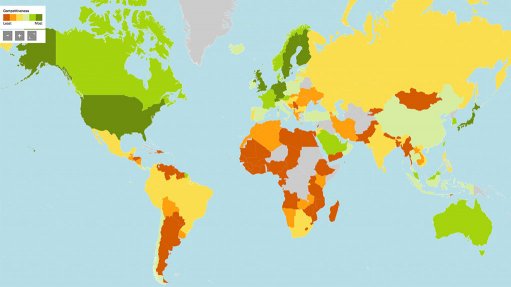
Despite high economic growth, competitiveness in Africa is stagnating, and even falling in some economies, the African Competitiveness Report has warned.
The report, released at the World Economic Forum on Africa, in Cape Town, cautioned that prospects for long-term sustainable growth on the continent were under threat.
The data pointed to low and stagnating productivity, partly owing to ongoing weakness in the basic drivers of competitiveness, such as weak institutions, infrastructure, health and education. The report said there were few signs that productivity on the continent was rising.
The biennial report profiled 40 African economies, with Mauritius leading the field in terms of competitiveness and South Africa slipping to second place.
“We are seeing, on the one hand, a decline in the agricultural sector in the last decade, and on the other, a rapidly rising services sector,” said WEF economist and report co-author Caroline Galvan.
South Africa, Senegal, Tunisia and Mauritius were top performers in Africa on the services side, with Mauritius performing particularly well in the export of business services and finance.
“A deeper examination of trade statistics suggests that services are much more significant for Africa than previously thought,” the report highlighted.
Agriculture provided an important source of income for most of Africa’s people, but productivity remained too low and based on small-scale subsistence production.
The report suggested that regional value chains, helping small-scale farmers access markets and promoting more rights and opportunities for women who make up most of the agricultural workforce in Africa, would help boost the industry.
Further, information and communication technology (ICT) had the potential to revolutionise the agricultural sector, according to African Development Bank principal research economist Jennifer Moyo.
“ICT can be used across the production cycle – from pre-crop selection to informed choices about crop insurance, providing information about the right amount and type of fertiliser and communicating prices to farmers.”
This could also help to stem agricultural losses in Africa, which amounted to 30%.
“We need to ensure that farm produce moves quickly from farm to market. We need rural feeder roads and road networks, while storage needs to be enhanced, so that farmers can get good prices in and out of season.”
More agricultural land needed to be irrigated. Currently, only 4% of agricultural land was under irrigation.
Some progress had been made in research and development on the agricultural side, with new varieties of rice and beans being developed on the continent.
The report said labour-intensive sectors needed to play a greater role in Africa’s transformation.
“The growth in services – both in terms of gross domestic product and employment – cannot propel Africa’s growth alone,” the reports added.
Even in services, development remains uneven, with too many people employed in low-productivity services, mainly in government.